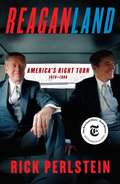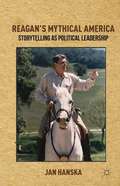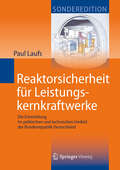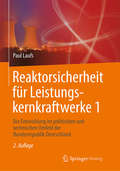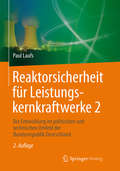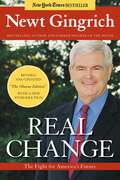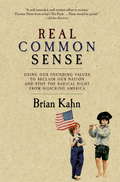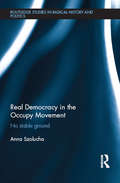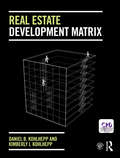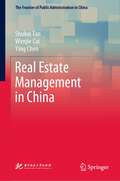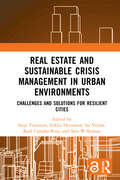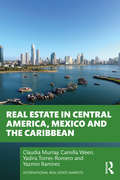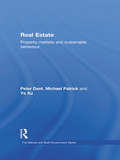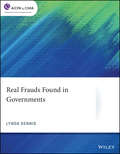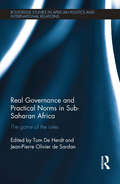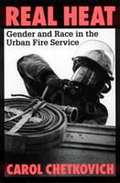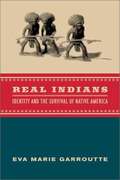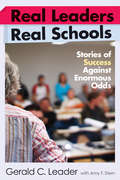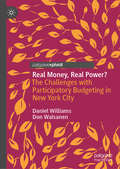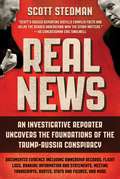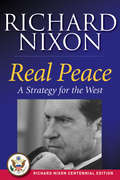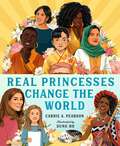- Table View
- List View
Reaganland: America's Right Turn 1976-1980
by Rick PerlsteinA NEW YORK TIMES NOTABLE BOOK OF 2020 From the bestselling author of Nixonland and The Invisible Bridge comes the dramatic conclusion of how conservatism took control of American political power.Over two decades, Rick Perlstein has published three definitive works about the emerging dominance of conservatism in modern American politics. With the saga&’s final installment, he has delivered yet another stunning literary and historical achievement. In late 1976, Ronald Reagan was dismissed as a man without a political future: defeated in his nomination bid against a sitting president of his own party, blamed for President Gerald Ford&’s defeat, too old to make another run. His comeback was fueled by an extraordinary confluence: fundamentalist preachers and former segregationists reinventing themselves as militant crusaders against gay rights and feminism; business executives uniting against regulation in an era of economic decline; a cadre of secretive &“New Right&” organizers deploying state-of-the-art technology, bending political norms to the breaking point—and Reagan&’s own unbending optimism, his ability to convey unshakable confidence in America as the world&’s &“shining city on a hill.&” Meanwhile, a civil war broke out in the Democratic party. When President Jimmy Carter called Americans to a new ethic of austerity, Senator Ted Kennedy reacted with horror, challenging him for reelection. Carter&’s Oval Office tenure was further imperiled by the Iranian hostage crisis, the Soviet invasion of Afghanistan, near-catastrophe at a Pennsylvania nuclear plant, aviation accidents, serial killers on the loose, and endless gas lines. Backed by a reenergized conservative Republican base, Reagan ran on the campaign slogan &“Make America Great Again&”—and prevailed. Reaganland is the story of how that happened, tracing conservatives&’ cutthroat strategies to gain power and explaining why they endure four decades later.
Reagan’s Mythical America
by Jan HanskaAmerican Storyverse introduces narratology as a relevant approach to the study of any US President, but especially Ronald Reagan. While initially much of the research conducted into the Reagan presidency was highly critical, many of the books written lately have been more like hagiographies. Reagan has been subjected to almost a worshipful attitude in the past two decades (see e. g. D'Souza 1997, Kengor 2006, Wallison 2003), and only recently more level-headed and objective studies have begun to emerge (see e. g. Wilentz 2008). There is a need to keep researching Reagan, but by taking new stances and original approaches. Hanska introduces a new interpretation of Reagan's success that goes beyond explaining his rhetoric. He takes a more comprehensive view by arguing that Reagan's political leadership focused on the use of stories as factual tools of policymaking. Reagan was a man fond of stories and his tendency to illustrate even the most confounding political challenges in short anecdotes and parables are an example of his ability as a storyteller. But that was not the whole scope of his narrative-based policies. The main argument is that with the aid of multiple stories about America, the American Way of Life and especially the American Dream Reagan narrated into existence a mythical America, which could be characterized as America where all its highest aspirations and ideals were manifested. This was not the world Americans lived in, but with aid of the ability of stories to create alternative realities or storyworlds (Herman 2004) of their own Reagan managed to alter the perception of people about the country they lived in. Instead of the mere storyworld that is built in the narrates interaction with the story Hanska introduce a concept of 'storyverse' to illustrate how such a complex and multifaceted storytelling as Reagan's was able to knit storylines into a 'storyweb' where common-sensical, ideological, cultural, political, mythical and even religious beliefs worked as snares to draw the audience into accepting one storyline and by following it deeper into the narrative superstructure were enticed to accept more and more beliefs without even consciously noticing their influence. Reagan's mythical America was not the United States of America that exists with clear boundaries on the map, but rather an imagined community that people were happy to inhabit. It was a place of everyday heroism and good deeds, love within families and communities, a land where indeed there always was a 'new morning for America. ' The skillful storytelling created an entire storyverse of belief of what it meant to be an American and a part of this mythical community and by maneuvering people in and out of different storyworlds within the entire metanarrative Reagan was able to immerse the citizenry in his storyverse and exclude politically disadvantageous factors almost completely. Of course, just as in every story, the audience needs to accept it as worth listening to, and this requires belief. This explains why Reagan was simultaneously loved and hated by the citizens. There was no middle ground. If one chose not to accept Reagan's political vision of America as fundamentally 'true, ' they were strongly opposed to all Reagan stood for.
Reaktorsicherheit für Leistungskernkraftwerke
by Paul LaufsIn dem Band wird die Entwicklung der Reaktorsicherheit in deutschen Leichtwasser-Kernkraftwerken nachgezeichnet. Dabei wird auf die Rolle internationaler Vorbilder ebenso Bezug genommen wie auf nationale und internationale Risikostudien. Anhand des Beispiels Reaktorsicherheit wird deutlich, unter welchen politischen Bedingungen internationale Großforschungsprojekte entwickelt werden: Sicherheitsreserven und -kultur wurden in dem Moment verbessert, als die Frage der Nutzung der Kernenergie in das Zentrum der politischen Auseinandersetzungen rückte.
Reaktorsicherheit für Leistungskernkraftwerke 1
by Paul LaufsIn dem Band wird die Entwicklung der Reaktorsicherheit in deutschen Leichtwasser-Kernkraftwerken nachgezeichnet. Dabei wird auf die Rolle internationaler Vorbilder ebenso Bezug genommen wie auf nationale und internationale Risikostudien. Anhand des Beispiels Reaktorsicherheit wird deutlich, unter welchen politischen Bedingungen internationale Großforschungsprojekte entwickelt werden: Sicherheitsreserven und -kultur wurden in dem Moment verbessert, als die Frage der Nutzung der Kernenergie in das Zentrum der politischen Auseinandersetzungen rückte.
Reaktorsicherheit für Leistungskernkraftwerke 2
by Paul LaufsDas Werk beschreibt die wesentlichen Tätigkeitsfelder der Entwicklung der Kernenergienutzung im politischen und technischen Umfeld der Bundesrepublik Deutschland. Insbesondere die Entwicklung der Reaktorsicherheit deutscher Leichtwasser-Kernkraftwerke wird aus den Anfängen heraus mit ihren vielfältigen Bezügen zu ausländischen Vorbildern, zu nationalen und internationalen Forschungsvorhaben sowie zu konventionellen und nuklearen Schadensereignissen wiedergegeben.In diesem Band 2 werden die Sicherheitsfragen in Bezug auf die zentrale und wichtigste Komponente eines Kernkraftwerks vertieft, den Reaktordruckbehälter. Den in Deutschland verwendeten Reaktortechnologien werden zukünftige Optionen gegenübergestellt. Die hier vorliegende 2. Auflage enthält Ergänzungen, Korrekturen und neue Abbildungen. Neu bearbeitet wurden das Alterungsmanagement langjährig betriebener Anlagen, der Rückbau und die Entsorgung radioaktiver Abfälle.Detaillierte und reich bebilderte Darstellungen sind Kennzeichen der sachlichen Behandlung des Themas. Den in Band 1 dargestellten spezifischen Sicherheitstechniken, wie die Berstsicherheit der druckführenden Umschließung, die Sicherstellung der Notkühlung, die notwendige Leittechnik und der Umgebungsschutz, werden nun in Band 2 auch die detaillierten Betrachtungen des Alterungsmanagements, des Rückbaus von Kernkraftwerken und der Entsorgung radioaktiver Abfälle hinzugefügt. Die Inhalte schließen auch Ergebnisse nationaler und internationaler Risikostudien ein. Es wird gezeigt, wie die nationalen und internationalen Anstrengungen von Industrie, Staat und Wissenschaft zur Erhöhung der Sicherheitsreserven und zur Verbesserung der Sicherheitskultur in einem gesellschaftlichen Umfeld vorangetrieben wurden, in dem die Frage der Kernenergienutzung zu einem zentralen Thema der politischen Auseinandersetzungen wurde.
Reaktorsicherheit für Leistungskernkraftwerke: Die Entwicklung im politischen und technischen Umfeld der Bundesrepublik Deutschland
by Paul LaufsIn dem Band wird die Entwicklung der Reaktorsicherheit in deutschen Leichtwasser-Kernkraftwerken nachgezeichnet. Dabei wird auf die Rolle internationaler Vorbilder ebenso Bezug genommen wie auf nationale und internationale Risikostudien. Anhand des Beispiels Reaktorsicherheit wird deutlich, unter welchen politischen Bedingungen internationale Großforschungsprojekte entwickelt werden: Sicherheitsreserven und -kultur wurden in dem Moment verbessert, als die Frage der Nutzung der Kernenergie in das Zentrum der politischen Auseinandersetzungen rückte.
Real Change: The Fight for America's Future
by Newt GingrichAmericans don't just want change this election year, they want real change-but most have no idea where it will come from. Democrats can't provide it and Republicans won't. But former Speaker of the House Newt Gingrich does. He explains what is wrong with our country and how to solve our problems in his blockbuster new book, Real Change: From the World That Fails to the World That Works.In this no-holds-barred assessment of American politics, Gingrich approaches our nation's problems with a private-sector mentality and an entrepreneurial spirit, offering commonsense solutions for the issues of today and the challenges of tomorrow.He lambasts both parties for creating a "government of the bureaucrats, by the consultants, and for the special interests" and busts the myth that voters are entrenched in a "red state" vs. "blue state" mentality. Gingrich exposes the truth: Americans are united on almost every important issue. It's the politicians who drag us into partisan bickering and away from real change.
Real Common Sense
by Brian KahnAmerica's extreme Right falsely claims the Founding Fathers as allies for their radical agenda. Pundit Glenn Beck has gone so far as to use the title of Tom Paine's famous 1776 pamphlet Common Sense for his own book--a book that attacks the political, social and economic rights which Paine and the Founders fought for.It's time to cut through the rhetoric, smoke, and spin, and get back to our core American values. We have gone off course as a country by emphasizing consumerism over citizenship, entertainment over education, and "me" over "we." By rediscovering the moral compass our Founders put into place, we can create a united America, and a future worthy of our grandchildren.
Real Democracy Occupy: No Stable Ground (Routledge Studies in Radical History and Politics)
by Anna SzoluchaThe liberal representative model of democracy is in a crisis. In protest camps, neighbourhood assemblies and through other non-hierarchical initiatives, the Occupy movement as well as other recent anti-austerity movements are redefining democracy as a positive way to engage with this crisis. The more direct democratic models of organisation that they are employing are not aimed at making the politicians regain their lost public legitimacy. Instead, direct democracy is perceived by these movements as a radical alternative to the established forms of representation. Can direct democracy become an actual alternative to representative democracy? This book takes an engaged and in-depth look at the Occupy movement in Ireland and the San Francisco Bay Area in the US in order to present the most up-to-date evidence of the changing nature of popular democratic demands. It takes an insider’s perspective to analyse the internal processes and iterations of the movement. Establishing links between social movements and transformations of democracy, as well as underscoring the significance of the recent movements for the future of democracy, this book is essential reading for students, scholars and activists interested in direct democracy, social movements, and radical politics more generally.
Real Estate Development Matrix: A Handbook
by Daniel B Kohlhepp Kimberly J. KohlheppThis book presents a new way of thinking about, teaching, learning, and practicing real estate development. Real Estate Development Matrix describes the process in a two-dimensional model and presents seven Development Stages which form the horizontal axis, and eight sets of Development Tasks which form the vertical axis to define a 56-cell matrix. In each cell, money is spent and risks are taken to achieve certain tasks and thereby create (or destroy) value. This holistic process considers the entire life cycle of real estate from its "green field" inception to its "brown field" state. The book is written by a real estate developer and academic, and the presented material is conceptual, practical, and non-technical. Jargon has been minimized as much as possible as the author introduces an entirely new model for real estate development that is both academically authoritative and developed in practice. It is aimed at a general professional audience participating in the development process, but equally the book is ideal for use as a textbook in undergraduate and graduate courses in real estate development, and an excellent supplemental text for business courses discussing real estate finance and investment. It may also be used as a textbook for professional courses, workshops, or seminars in real estate development. The book is supported by an interactive website at http://realestatedevelopmentmatrix.com/
Real Estate Management in China (The Frontier of Public Administration in China)
by Ying Chen Shukui Tan Wenjie CaiThis book reflects the great changes in terms of real estate sales, purchases, finance and policies from planned economy to market economy in China. Real estate system has always been a great concern to the public for its irreplaceable role in people’s lives and various daily affairs, as well as in the development of the whole economy, especially in China’s context. The unique perspective of this book lies in the significant role that the Chinese government plays in real estate system. This book aims to help readers to understand China’s real estate system comprehensively.
Real Estate and Sustainable Crisis Management in Urban Environments: Challenges and solutions for resilient cities
by Sara Wilkinson Saija Toivonen Sirkka Heinonen Ira Verma Raúl Castaño-RosaThe aim of this book is to promote the dynamic resilience of societies by identifying, analysing, and exemplifying the role of space and land use in both anticipated and unanticipated primary and secondary crisis situations. The book brings together the expertise of a unique team of researchers and methods from fields of futures studies, land use planning, social sustainability and wellbeing, architecture, spatial planning, design and real estate economics, and presents a novel understanding of the direct and indirect impacts of possible crises in the space and land use context. It goes on to discuss the concept of resilience and exemplifies potential solutions and offers a holistic and forward-looking approach for crisis management through a lens of social sustainability and wellbeing, making an important contribution to the promotion of wellbeing in the built environment, especially in terms of land and residential space and building use. This book does not only identify barriers and successful incentives in resilient crisis management but also discusses the role of different stakeholders (e.g., households, office workers, real estate owners, space occupants, firms, the public sector, etc.) in crisis management. Finally, international case studies aiming to tackle the challenging landscape of future threats are presented, along with novel tools to support the development of future policies, regulations, and management practices in the built environment, which can increase the dynamic resilience of societies. Overall, this book is essential reading for decision-makers in the public and private sectors, urban developers, space and spatial designers, architects, planners, community stakeholders, real estate investors, facility managers and crisis and corporate responsibility managers.
Real Estate in Central America, Mexico and the Caribbean (Routledge International Real Estate Markets Series)
by Camilla Ween Claudia Murray Yadira Torres-Romero Yazmin RamirezThis book examines real estate markets and urban development in Central America, Mexico and The Caribbean (CAMEC). It considers both residential and commercial real estate with a focus on industrial and hospitality sectors, infrastructure and logistics. The CAMEC region is besieged by complexity. Prone to natural disasters, and with the Mexico/US border constituting the largest human migration corridor on Earth, the region is also a vital trading hub for goods, linking commerce between the world’s two largest oceans and the Americas. The real estate markets in this area are dynamic, rapidly developing and under researched. This book analyses the particularities of these markets and the context in which investors and developers operate. The authors present case studies and contributions from key players in major cities in the region. The book exposes the regional risks and opportunities connected to urban development including market transparency, urban equity and development regulation. The research presented in this volume gives the reader a comprehensive picture of each country under study, detailing their individual commercial, residential, industrial, leisure and infrastructure sectors. This is essential reading for international investors, real estate students, researchers, and professionals with an interest in the region.
Real Estate: Property Markets and Sustainable Behaviour (Natural and Built Environment Series)
by Peter Dent Michael Patrick Xu YeTraditional studies of the property market have tended to focus solely on commercial and legal issues, but the growing importance of the issue of sustainability means that a different approach is needed. This new textbook provides an overview of property within a market context, examining the complex nature of property rights and issues related to both investors and occupiers. At the same time it assesses property from the perspective of financial, social and environment sustainability. Topics covered range from the characteristics of property and depreciation, to ownership and development through to investments and sustainability reporting. The book concludes with key skills in sustainable knowledge needed by those working in the real estate industry. Written by an author team of experienced property professionals, this essential introductory textbook is well suited for property, planning and architecture students on undergraduate, graduate and conversion courses, as well as those on CPD and training programmes in related areas.
Real Frauds Found in Governments (AICPA)
by Lynda DennisFrauds in governments are as unique as government entities themselves. In this book, you will learn about real-world government fraud, including cyber fraud, and your responsibilities when dealing with government. Analyzing several unique frauds that occurred in the sector, this book offers a comprehensive learning approach using examples, explanations of audit standards, and informative case studies. Key topics include: misappropriation of assets, external financial reporting, cyber fraud, management override, and improper use of procurement cards.
Real Governance and Practical Norms in Sub-Saharan Africa: The game of the rules (Routledge Studies in African Politics and International Relations)
by Tom De Herdt Jean-Pierre OLIVIER de SARDANAlthough international development discourse considers the state as a crucial development actor, there remains a significant discrepancy between the official norms of the state and public services and the actual practices of political elites and civil servants. This text interrogates the variety of ways in which state policies and legal norms have been translated into the set of practical norms which make up real governance in sub-Saharan Africa. It argues that the concept of practical norms is an appropriate tool for an ethnographic investigation of public bureaucracies, interactions between civil servants and users, and the daily functioning of the state in Africa. It demonstrates that practical norms are usually different from official norms, complementing, bypassing and even contradicting them. In addition, it explores the positive and negative effects of different aspects of this ‘real governance’. This text will be of key interest to academics, students and researchers in the fields of development, political science, anthropology and development studies, African studies, international comparative studies, implementation studies, and public policy.
Real Heat: Gender and Race in the Urban Fire Service
by Carol ChetkovichThirty years of legal and political efforts have opened the doors of this historically white male preserve, but men of color have yet to consolidate their gains, and women's progress has been even more tenuous. In this unique and compelling account of affirmative action at the "street level," Carol Chetkovich explores the ways in which this program has succeeded and failed.
Real Indians: Identity and the Survival of Native America
by Eva Marie GarroutteAn insightful and original analysis of the competing ways that Indian identity is defined, followed by a discussion of a new way of defining Indian-ness, which the author calls "indigenous theory."
Real Leaders, Real Schools: Stories of Success Against Enormous Odds
by Amy F Stern Gerald C. LeaderReal Leaders, Real Schools tells the stories of five urban public school principals who led their schools through profound and transformative changes. In each of these cases, their efforts resulted in dramatic improvements in student achievement--improvements that occurred within the current environment of high-stakes tests. The revealing and often gripping narratives that form the heart of this remarkable book offer unprecedented insights into the meaning and practice of effective school leadership. The stories themselves are often inspiring but they are never idealized. All of these principals met with frustrations as well as successes, setbacks as well as breakthroughs. All regularly reassessed their policies and practices, and all acknowledged--and learned from--their errors along the way. Yet all believed in their staffs and their students, and all found innovative ways to transform and improve their schools. These are true stories of successful leadership against enormous odds. They provide countless lessons for today's school leaders and all who are committed to education reform.
Real Leaders, Real Schools: Stories of Success Against Enormous Odds
by Amy F Stern Gerald C. LeaderReal Leaders, Real Schools tells the stories of five urban public school principals who led their schools through profound and transformative changes. In each of these cases, their efforts resulted in dramatic improvements in student achievement—improvements that occurred within the current environment of high-stakes tests. The revealing and often gripping narratives that form the heart of this remarkable book offer unprecedented insights into the meaning and practice of effective school leadership. The stories themselves are often inspiring but they are never idealized. All of these principals met with frustrations as well as successes, setbacks as well as breakthroughs. All regularly reassessed their policies and practices, and all acknowledged—and learned from—their errors along the way. Yet all believed in their staffs and their students, and all found innovative ways to transform and improve their schools. These are true stories of successful leadership against enormous odds. They provide countless lessons for today&’s school leaders and all who are committed to education reform.
Real Money, Real Power?: The Challenges with Participatory Budgeting in New York City
by Daniel Williams Don WaisanenNew York City has the largest council-sponsored Participatory Budgeting (PB) processes in North America. From its inception in Brazil, PB was a process that empowered the least-advantaged members of the community by providing a way to propose budget allocations through voting. This book reports on a multi-methodological study of New York City’s participatory budgeting (PB) process from the perspective of a city resident over time. A participatory budgeting slogan purports that the initiative offers “real power” and “real money” to constituents at a local level. To critically examine such top-down assertions, and different than much that has been written about PB, this book researches and navigates its events the way a member of the community would see it. The study reveals a lack of transparency, manipulation by city agencies, the favorable treatment of insider proposed projects, and a failure to reveal the basis of project costs. It also finds that there is no singular participatory budgeting project in New York City. Instead, there are numerous participatory budget projects, as many as there are council members who engage in the practice. This book provides a ground-level view of these limitations and recommends substantial reform.
Real News: An Investigative Reporter Uncovers the Foundations of the Trump-Russia Conspiracy
by Scott StedmanDocumented Evidence of the Trump-Russia Conspiracy Investigative reporter Scott Stedman has made waves worldwide with his hard-hitting investigative journalism, going as far as anyone has to uncover the deep roots of the Trump-Russia Conspiracy. His research has been cited by the Washington Post, BBC, Reuters, CNN, McClatchy, the Daily Mail, the Guardian, and Vice, and has even helped guide Congress’s investigations.Real News collects, for the first time in print, Stedman’s eye-opening research into and evidence of every level of the Trump-Russia Conspiracy, from the 2016 Trump Tower Meetings to the dirty-money deal for Trump Tower Moscow, from the “coffee boy” George Papadopoulos and his mysterious wife to Russian infiltration of the National Rifle Association, from Cambridge Analytica’s sketchy business deals and influence operations to the battle for true journalism that will combat cries of “Fake News!” Full of real, exclusive evidence including ownership records, flight logs, banking information and statements, meeting transcripts, maps, quotes, stats and figures, cease and desist letters, and more, Real News not only enables readers to see and evaluate the arguments for the existence of the Trump-Russia Conspiracy for themselves, it also fully explains how Stedman went about his investigations to discover the truth. Anyone who is interested in the evidence—the real news about the Trump-Russia Conspiracy—needs to read this book.
Real Peace
by Richard NixonOne of Richard Nixon's most incisive works on American foreign policy, Real Peace argues that lasting peace can only be achieved through "hard-headed détente"--a pragmatic mixture of military preparedness, effective arms control, and improved East-West economic ties.
Real Princesses Change the World
by Carrie A. PearsonReal Princesses Change the World is an inspirational and diverse picture book profiling 11 contemporary real-life princesses and 4 heirs apparent from all around the world.There are so many ideas of what princesses are: Princesses are sweet, beautiful, and gracious. Princesses wear poofy dresses and strut about their castle. Princesses are just missing a handsome prince. But what message does that send to the children who look up to them? This picture book compiles biographies of 11 different princesses, highlighting who they truly are: diplomats, engineers, activists, athletes, and so much more. It focuses on their achievements and contributions, situating them as active members in the global and local community. From Nigeria to Japan, Saudi Arabia to Sweden, and Thailand to Tonga. This picture book takes readers on a trip that spans the whole world. With stunning portraits done by bestselling illustrator Dung Ho (Eyes that Kiss in the Corners), Carrie A. Pearson's Real Princesses Change the World showcases princesses in an empowering, feminist light that is both accessible and engaging for young readers.
Real Property in Australia: Foundations and Applications
by Michael J. HefferanReal property in the form of investment, ownership and use pervades almost every aspect of daily lives and represents over 40% of Australia’s wealth. Such assets do not exist in isolation – they are dynamic and forever evolving, impacted by a range of physical, economic, demographic, legal and other forces. Consequently, a true appreciation of individual assets and of the property sector as a whole demands an understanding of both the assets themselves and the context and markets in which they exist. The sector is complex and, on the face of it, confusing. It is however, not without logic and underlying themes and principles. This book provides a wider understanding of how the real property sector works. It covers topics such as the nature of real property and its functions, economic drivers, valuation principles, legal and tenure parameters, property taxation, land development and subdivision, asset and property management and sustainability – all critical components in this complex and critically important sector. It provides a wide and balanced perspective for experienced practitioners, investors, students and anyone involved in property decision-making or wishing to secure a deeper understanding of these areas. The book integrates research-based theory with practical application and first-hand insights into a sector that underpins the Australian economy, its communities and its sustainability.
